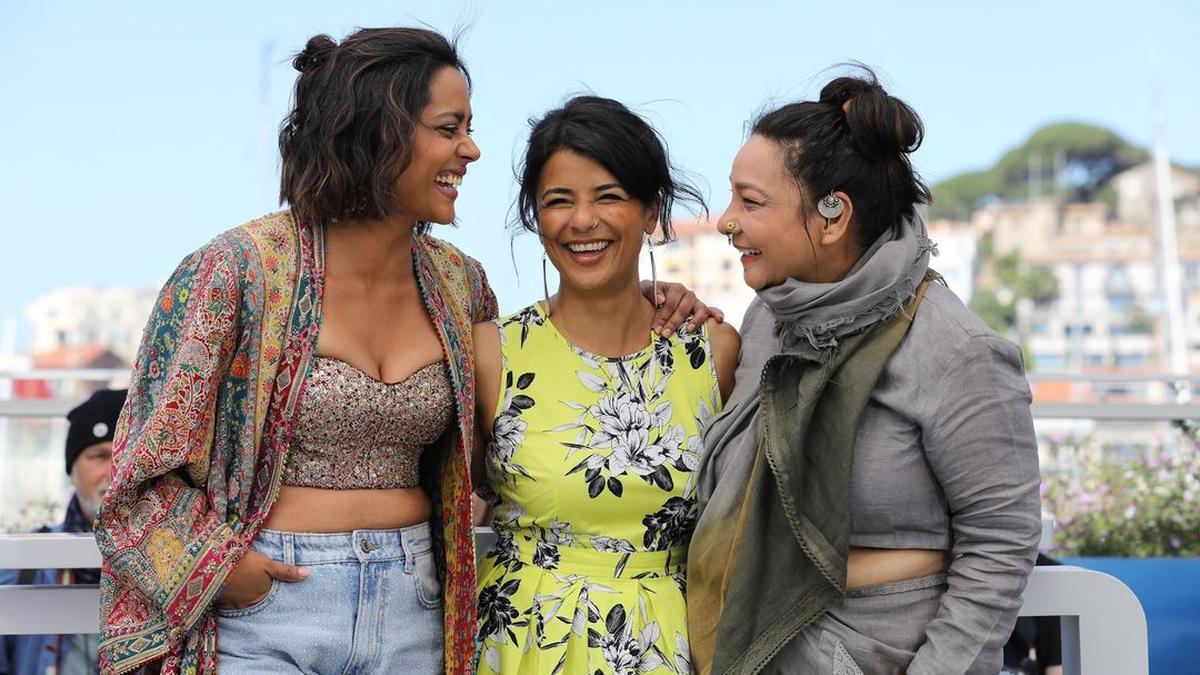
Actor Sahana Goswami and director Sandhya Suri recently made waves at the prestigious Cannes Film Festival 2024 by premiering their much-anticipated film, “Santosh,” in the Un Certain Regard section. The annual film festival, renowned for introducing some of the most thought-provoking and artistically ambitious films, served as the perfect stage for the debut of this gripping police drama.
Goswami, who is already a respected name in the Indian film industry, attended the festival in a stunning ensemble that caught everyone’s eye. She graced the red carpet in a bespoke saree featuring a blouse adorned with hand-embroidered Swarovski crystals. This impeccable outfit was the creation of the acclaimed Indian designers Abu Jani and Sandeep Khosla, who have a history of dressing stars in the most elegant attires for significant events.
Not to be outdone by her initial look, Goswami later posted a photo of her second outfit from the festival on social media. This time, she chose an elegant black gown designed by Rohit Gandhi and Rahul Khanna, which perfectly complemented her first ensemble while showcasing her versatility in sartorial choices.
Her co-stars from “Santosh,” Sunita Rajwar and Sanjay Bishnoi, also represented the film at the festival, making sure that the cast had a strong presence at this international event. The trio, along with director Sandhya Suri, engaged in a photocall session that added an informal touch to their festival appearance. For this photoshoot, Goswami opted for a casual yet chic look, donning jeans and a long, handcrafted shrug. Her choice of attire highlighted a juxtaposition between the glamour of her red carpet appearances and the grounded, everyday aesthetic.
“Santosh” itself is a hard-hitting police drama set in the hinterlands of Northern India. The narrative revolves around a harrowing investigation into the rape and murder of a teenage Dalit girl. The film not only aims to bring attention to the grim realities faced by marginalized communities but also showcases the resilience and courage of those seeking justice. Sandhya Suri, who has previously directed the short film “The Field” (2018) and the poignant documentary “I for India” (2005), marks her feature film debut with “Santosh.
.” This powerful narrative has already garnered significant attention and praise for its raw portrayal of a deeply distressing issue.
Following its well-received premiere at Cannes, “Santosh” was quickly picked up for North American distribution by Metrograph Pictures, a notable move that promises to broaden its audience base. Variety, an industry authority, reported this acquisition, highlighting the growing interest and recognition of Indian cinema on the global stage.
The participation of Indian cinema at the Cannes Film Festival symbolizes a significant stride toward greater representation and acknowledgment. Films like “Santosh” play a crucial role in bringing diverse stories to international audiences, fostering a better understanding of the socio-cultural dynamics within India. Celebrating the talents of filmmakers like Sahana Goswami and Sandhya Suri not only provides a platform for Indian stories but also emphasizes the global nature of cinematic art.
The successful outing at Cannes is expected to have a ripple effect on the reception of “Santosh” once it is released for general viewing. The film’s compelling storyline, combined with powerful performances, positions it as a must-watch, both for its artistic value and its social message. For Sahana Goswami, this festival appearance also serves to underline her growing influence and versatility as an actor, capable of adapting to varied and complex roles.
As for Sandhya Suri, the positive response to her first feature film is promising. It suggests an impactful journey ahead, where she continues to bring poignant and socially relevant stories to the fore. Her dedication to shedding light on underrepresented issues through her films has not only garnered her critical acclaim but has also established her as a significant voice in contemporary cinema.
In conclusion, the premiere of “Santosh” at Cannes 2024 marks a landmark moment not just for its creators but for Indian cinema as a whole. The film’s journey underscores an increasing appetite for diverse narratives that challenge and engage audiences worldwide. As “Santosh” moves from the festival circuit to wider distribution, it stands as a testament to the enduring power of film as a medium for cultural dialogue and social change.












